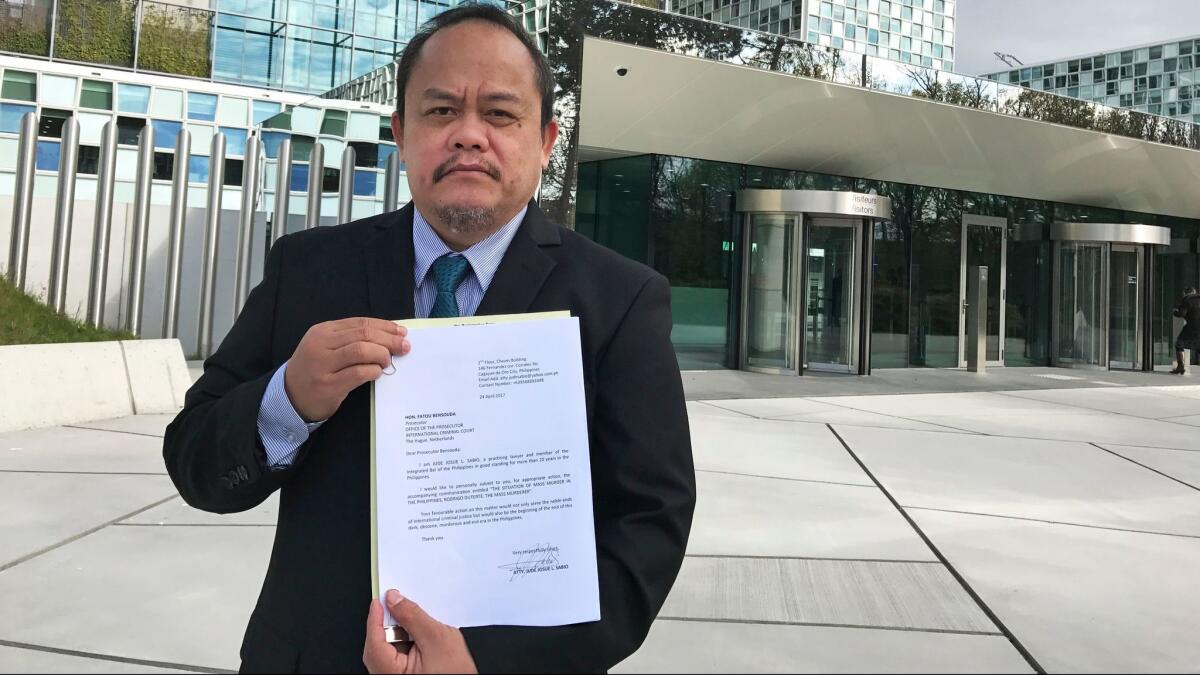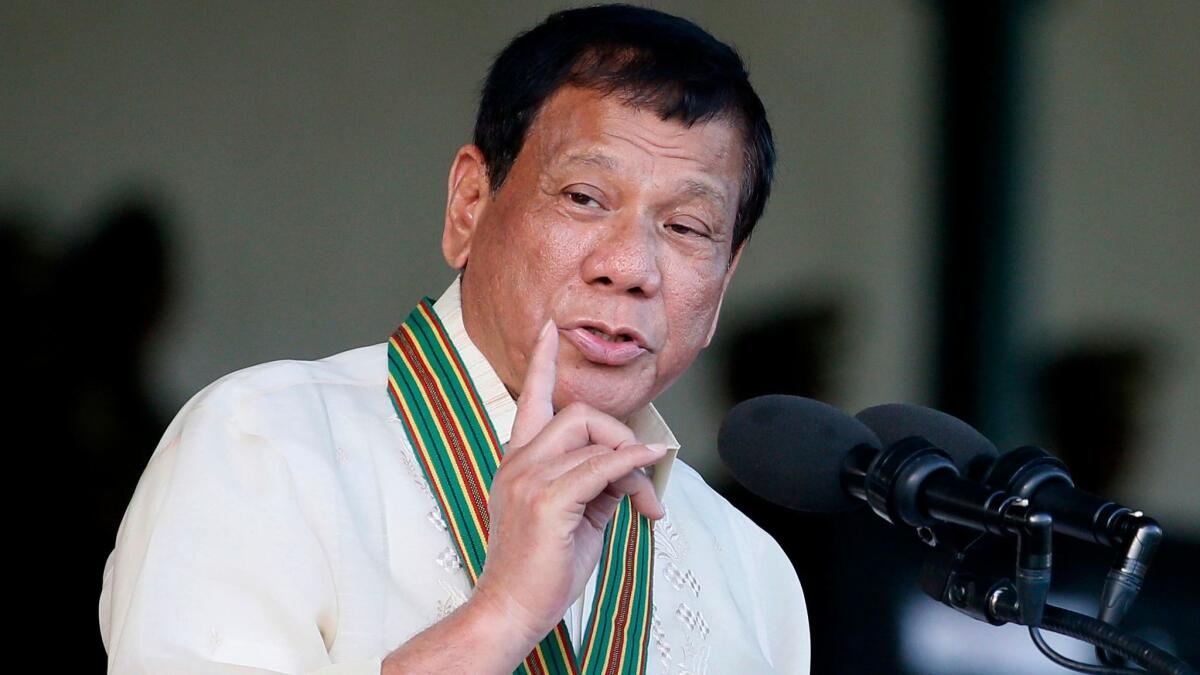International Criminal Court filing accuses Philippines’ Duterte of carrying out ‘national bloodbath’

- Share via
Reporting from Manila — A Filipino lawyer filed a complaint Monday with the International Criminal Court accusing Philippine President Rodrigo Duterte of crimes against humanity and mass murder — charges stemming from his war on drugs, which has left thousands dead.
The complaint, filed with the court in The Hague, blames Duterte for “a terrifying, gruesome and disastrous commission of extra-judicial killings,” beginning when he was mayor of Davao city in the southern Philippines and continuing during his term as president.
Duterte, who ran for president on a tough-on-crime platform, has encouraged the killings of thousands of suspected drug dealers and has boasted of personally killing three people when he was mayor of Davao.

Attorney Jude Sabio, in his filing, charges that Duterte was responsible for more than 1,000 murders at the hands of the “Davao Death Squad” when he was mayor for two decades before being elected president last year, and has broadened the practice since then to include an additional 7,000 deaths nationally.
“Immediately after taking his oath as president, he launched a virulent and brutal national campaign against illegal drugs, more popularly called ‘war on drugs,’ that has resulted in a national bloodbath in a scale never seen before in recent history,” the complaint states.
A lawyer for Duterte dismissed the complaint as false and politically motivated.
The allegations that Durerte oversaw a vigilante death squad as mayor, along with impeachment complaints filed last month and dipping popularity ratings, suggest that he may be paying a political price for his crackdown on illegal drugs.
It is not clear, however, whether the International Criminal Court filing will lead to an indictment, and the court has a modest record of actually bringing leaders to justice. Its reach is limited to countries that signed and ratified the Rome statute that created the court in 1998 and have not since rescinded their approval. Among the countries not covered by the court are the United States, Russia, China and Israel.
African countries have complained that they are singled out by the court, and have agreed to a plan for a mass withdrawal.
Duterte’s opposition is determined to hold the president accountable in some way, and many Filipinos say the prospects for impeachment are dim because Duterte has the support of a majority of Congress.
“Duterte is an abomination to the presidency. How can you have a president who is killing his own people?” Sabio said in an interview before filing the case.
Sabio is the lawyer of Edgar Matobato, who confessed to being a hitman for the Davao Death Squad last September during a Philippine Senate probe into the extrajudicial killings. Suspected drug dealers as well as users — mostly poor young men in urban slums — have been gunned down with impunity by police and, in some cases, private citizens.
In testimony filled with gruesome details, including a description of cutting up victims and throwing them into a river to be eaten by crocodiles, the 57-year-old Matobato named Duterte as the mastermind of the death squad and implicated Davao police officer Arturo Lascañas as one of ringleaders.
According to Sabio, his client’s testimony is critical to the ICC case. “We can now establish a pattern to show that when he was mayor of Davao city, President Duterte used the Davao Death Squad as a system to eliminate criminals and control crime,” he said.
When first summoned by the Senate committee in October, Lascañas categorically denied the existence of the death squad. He recanted his statement and made a public confession four months later after he had retired from the police force.
According to Lascañas, the squad eliminated petty criminals and drug users but later expanded to killing political rivals, including journalists who were critical of Duterte. He also claimed that Duterte issued kill orders, and supplied cash to buy unregistered firearms and issue rewards for each kill. Senior members such as Lascañas enjoyed perks, including a monthly cash allowance of $2,000.
“We were run like a Mafia family,” Lascañas said.
Matobato and Lascañas have been under protective custody since their public confessions. Lascañas fled to Singapore in April 2016, saying that there were “increased threats” to his security.
The potential ICC case follows the impeachment complaints filed by Congressman Gary Alejano, based in part on what the complaint says was Duterte’s failure to defend the country’s territorial rights in the South China Sea.
China’s sweeping territorial claims over the South China Sea have made for hostile relations between the two countries. Last year, the Philippines elevated a territorial dispute with China to the Permanent Court of Arbitration in The Hague, which ruled in favor of the Philippines.
Duterte, however, set aside the ruling and chose to extend friendly overtures to China, turning his back on the United States, with which the Philippines has a long and complicated history.
“Good relations should not be at the expense of national interest,” Alejano said. “As president, he should be the first to defend Philippine sovereignty. Duterte is acting like China’s spokesperson.”
Chief presidential counsel Salvador Panelo dismissed the impeachment complaints, corruption charges and ICC complaint.
“This is just a rehash of the complaints made during the campaign period. This is nothing but political harassment,” he said.
Panelo said he doubted that the ICC complaint would be successful because most of the drug-related killings were routine homicides and not state-initiated.
On the president’s pronouncements to kill criminals and reward police for doing so, Panelo said: “Those statements are hyperbole, meant to serve as a dramatic warning to criminals. It is never a crime to say, ‘I will kill you.’”
Antonio La Viña, an international lawyer and former dean of the Ateneo School of Government in the Philippines, expressed concerns about the implications of bringing a case before the ICC, saying that before that step is taken, “domestic remedies should be exhausted.”
“A finding that no remedy now exists in the country is a finding that rule of law is dead here,” La Viña said.
Santos is a special correspondent.
ALSO
A Philippine senator defies her president — from behind bars
China’s Xi urges Trump to use caution in handling North Korea
Christian governor of Jakarta ousted after tense election in world’s biggest Muslim country
More to Read
Sign up for Essential California
The most important California stories and recommendations in your inbox every morning.
You may occasionally receive promotional content from the Los Angeles Times.










